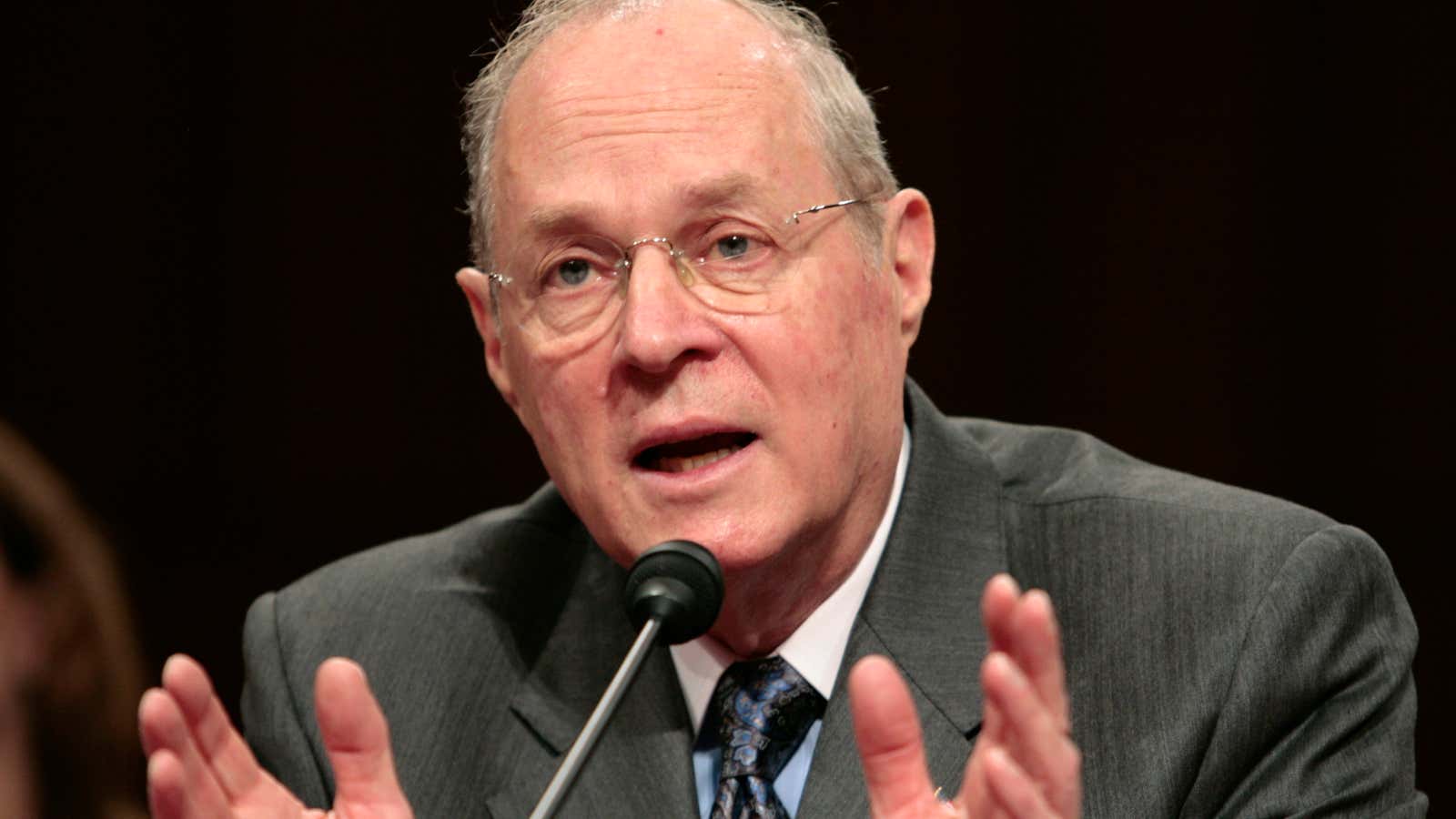In a stupefying case of irony, a single Supreme Court justice will have the “undue burden” of deciding whether Texas’s crushing 2013 omnibus bill places an “undue burden” on women seeking an abortion in the Lone Star State.
Renowned swing-voter Justice Anthony Kennedy has once again been declared “the Decider” in today’s (March 2) Supreme Court oral arguments regarding Whole Woman’s Health v. Hellerstedt. The case will determine whether the state’s damning omnibus law will be allowed to stand, or be declared unconstitutional. Hellerstedt, which has been called a “blockbuster abortion case” by the Atlantic and “the most important abortion case of a generation” by Mother Jones, is seen by many as foreshadowing the future of Roe v. Wade.
The case challenges the legality of the bill, which places a ban on 20-week abortions and carries a host of provisions that restrict physicians and women seeking abortions. The case hinges on whether those restrictions—specifically that abortion providing physicians must have admitting privileges at a hospital no more than 30 miles from the clinic, and that all clinics meet the standards for an “ambulatory surgical center”—are “undue.” It is this same legislation that Texas state senator Wendy Davis famously filibustered in 2013, warning that HB 2 would take us to a “dark place.” That dark place includes the closure of 34 of the 40 abortion clinics in Texas.
Kennedy has taken a relatively conservative stance on abortion in the past. According to ThinkProgress, “prior to HB 2, Justice Kennedy considered 21 abortion restrictions as a member of the Supreme Court and allowed 20 of them to take effect.” That single case where he disagreed with the restrictions? The 1992 Planned Parenthood case Planned Parenthood of Southeastern Pennsylvania v. Casey. That decision, which he co-authored, established the concept of “undue burden” as an indicator of whether a woman’s liberty to seek an abortion has been violated, as indicated by the terms of the due process clause of the Fourteenth Amendment.
Both pro-choice and anti-abortion advocates know that Kennedy functions as the lynchpin at the center of America’s seemingly eternal fight over who gets to control women’s bodies and reproductive health. It is the reason why 113 women who work in the legal profession have filed a 48-page amicus brief in support of reproductive justice. “The briefs are aimed largely at Justice Kennedy” because of his swing-vote status, Adam Liptak asserted in The New York Times. “One man’s perception of abortion is what matters the most here,” professor David S. Cohen remarked in the piece.
At this point, it’s unclear what is more infuriating: The fact that one white man holds such enormous power, or that dozens of women have been forced to prostrate themselves in an act that consequently reifies his position of power.
The brief’s testimonials describe how having easy access to an abortion allowed the women personal and professional freedom. These “humanizing” narratives, as their lawyer Alexia D. Korberg described them to the Times, are heart-wrenching and painful to read. The Fourteenth Amendment ensures the dignity and autonomy of every United States citizen. Yet women are continually forced to justify themselves when it comes to their own reproductive health.
How long will we be forced to fight for autonomy over our own bodies?
Decades after Roe v. Wade, this latest case highlights the fallibility of the contemporary framing of women’s reproductive justice in binary terms of pro-choice and pro-life. “Choice” is not the antithesis of “life.” In fact, the opposite is true. Choice is life. It is liberty. And it allows the pursuit of happiness.
Lost in this framing are the lives of women. Women have been dispossessed of both their bodies and the significance of their lives. Instead, their voices and experiences are silenced while pro-life advocates seek to give fetuses a voice in order to bestow the unborn with life. In the twisted, paternalistic language of HB 2, abortion restrictions are predictably described as “necessary to protect” women (from themselves, obviously). In Texas in particular, the women most affected by restrictions are also the most marginalized: undocumented Latinas and other women of color, especially women with few economic resources.
The real undue burden here lands squarely on the shoulders of an already dispossessed and oppressed class of American society: women who are forced to constantly fight for their fundamental rights to dignity and autonomy. For women in Texas and across America, it is incomparably exasperating that these rights (once again) rest in the hands of one white man.




